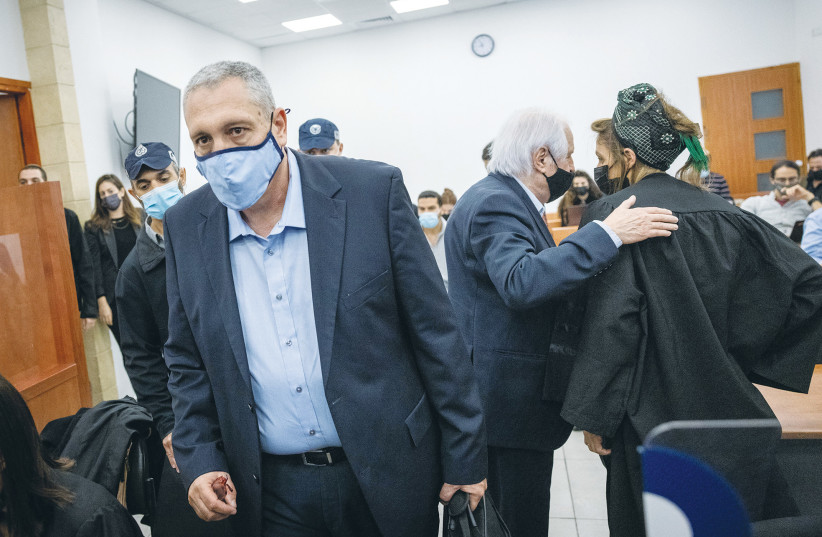By Wednesday, the trial of former prime minister Benjamin Netanyahu will have been stalled for nine days with more than five scheduled hearings missed due to the police cellphone-hacking scandal.
Will the state prosecution’s answer on Wednesday finally end the postponements and lead to the trial getting back on track by February 21?
The truth is, we have no idea and there are tons of possibilities of what happens next.
First, Wednesday is either the third or fourth extension that the state has received in order to give a full picture.
To date, the state has mostly just asked for more time and given very few details, other than steadily admitting that there were some cellphones hacked, while holding the line that there was no broad lawbreaking by the police.

This would not be the first time that the prosecution needed a month or so delay to provide additional information to the defense but eventually got right back on track without giving up any major points.
The first time was this past summer when the defense discovered that there were many text messages on former Walla CEO Ilan Yeshua’s cellphone that had not been provided to it – even as huge amounts had been provided. After the delay, the state wrapped up Yeshua pretty fast.
Likewise, if the state admits its hacking of former top Netanyahu aide turned state’s witness Shlomo Filber, but justifies it based on a prior court order granting access to his cellphone and then dismisses all other charges as false, it will be hard for the defense to gain traction for further delay.
The Jerusalem District Court already showed twice that it was doubtful of some of the charges in the Calcalist report against the police, even before the government started to get a second wind for backing the police.
But what if the state admits to charges that some attempt was discussed or made to hack defendant Iris Elovitch’s cellphone, and possibly one other person associated with the trial.
Iris is the wife of Bezeq and Walla owner Shaul Elovitch, and was allegedly directly involved in facilitating the media bribery scheme.
At this point, the prosecution might have to make some tricky calls about how important it is to keep her as a defendant in the case or whether it might be better to cut her loose or at least drop aspects of evidence connected to her.
If the prosecution tries to keep all evidence related to Iris in the case and admits to a problematic hack, we could be in for a longer delay to fight out the specifics.
Reports indicate one other figure in the case was hacked, so who and under what circumstances will determine how much that matters.
However, overall, there are increasing signs of confidence from the prosecution and the police that they will overcome the Calcalist report’s allegations and get this trial back on schedule, even if it might be delayed some additional days or weeks.
Part of the problem is that there is not much of a mechanism for a court to second guess the police’s review of itself within the confines of a criminal case.
Sure, the government can have the Mossad, Shin Bet (Israel Security Agency) or even a state inquiry second guess the police’s report, but there is no obvious path for the court to do this.
If the judges believe there is plenty of good evidence in the case, they are not going to allow months of delay due to what they might frame as “technical errors” by police, for which individual police should be punished but which do not help prove Netanyahu’s innocence.
All of that is timing and tactics. What about the substance?
Part of what the police probably have done wrong is connected to the fact that there is no existing law whatsoever to regulate hacking cellphones by law enforcement.
There is an eavesdropping law for bugging and listening in on communications, and a law for getting warrants to get physical access to search computers or cellphones, but not through remote-access hacking.
Also, there have been many reports about the police cyber intelligence unit fishing for items before the investigation stage.
Reportedly, if they did this prior to a formal probe, they could get away with not providing paperwork and keeping the issue from being reported to the police investigations division.
Confidential informants have frequently been used to carry out investigative activities that police officials themselves cannot do. Why wouldn’t the police have used third-party hackers to do the same?
So the exact facts of how, when and why the police hacked cellphones of persons involved in the Netanyahu trial must be understood before we can really unpack the consequences.
Under one set of facts, a policeman might not even get disciplined as he may have mistakenly but genuinely thought he was operating according to a court order, even if he went beyond it, since there is no real law in place to set redlines.
In a similar but slightly different set of facts, the same policeman could be sent to jail for abuse of power and grave violations of privacy.
We will only know the answers to these questions once the prosecution actually gives a detailed answer.
That detailed answer will give us a much more reliable crystal ball for predicting the next steps in what has already been among the country’s most dramatic trials ever.
